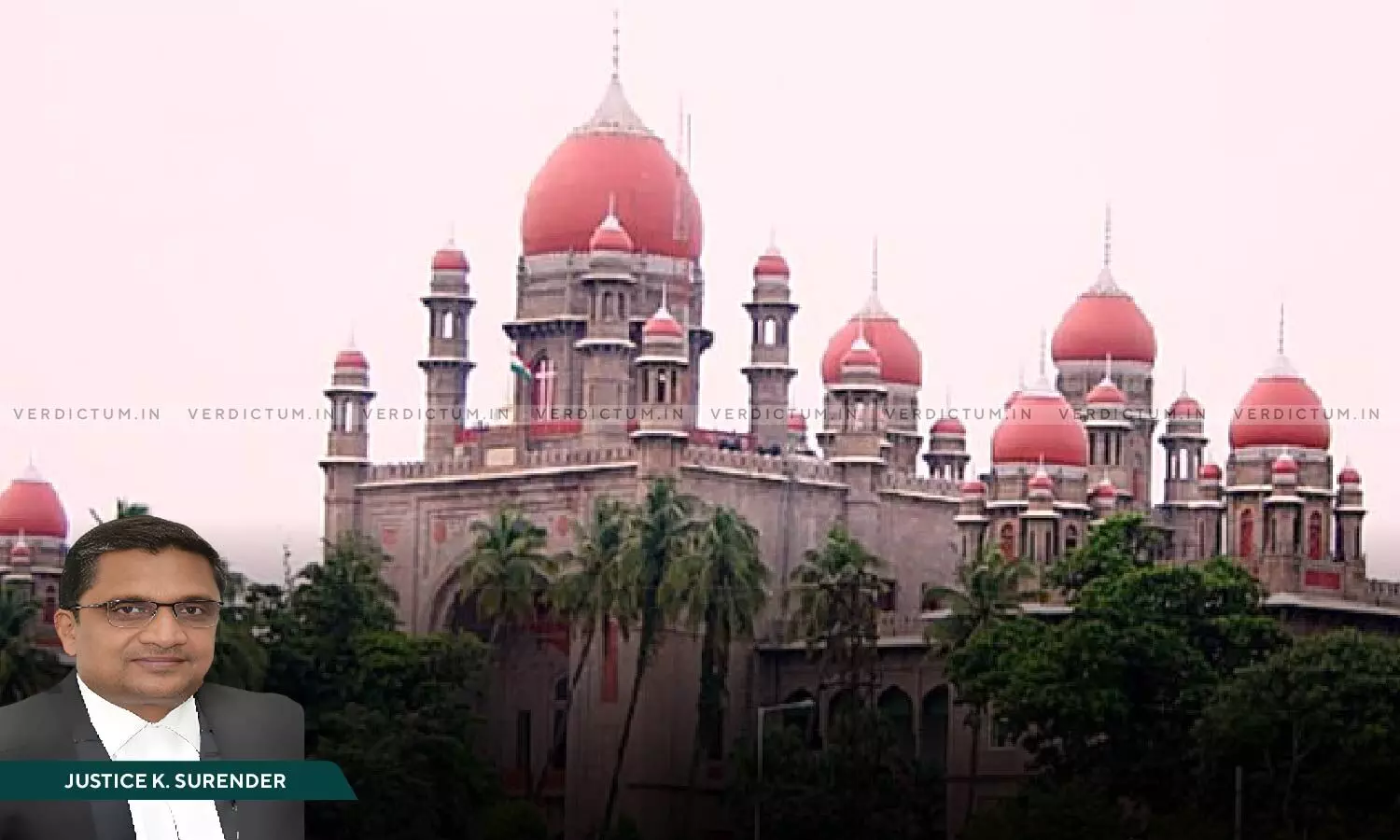
Prosecution Cannot Use Further Chief-Examination To Fill Lacunae In Evidence: Telangana High Court
 |
|The High Court made the observation in an Appeal filed by a former Special Revenue Inspector who had been convicted under Sections 7 and 13(1)(d) read with Section 13(2) of the Prevention of Corruption Act, 1988.
The Telangana High Court has held that the prosecution cannot conduct a "further chief examination" of a witness after cross-examination has concluded in order to fill lacunae in the evidence.
The Court emphasized that such a course of action is contrary to the scheme laid out under Sections 137 and 138 of the Indian Evidence Act.
The Single Bench of Justice K. Surender made the observation in an Appeal filed by a former Special Revenue Inspector who had been convicted under Sections 7 and 13(1)(d) read with Section 13(2) of the Prevention of Corruption Act, 1988.
"The prosecution cannot adopt the method of further chief-examination to fill in other lacunae, and the scope of re-examination is confined. To overcome such confined scope of reexamination, permitting the prosecution to conduct further chief examination is not the procedure that can be followed and is contradictory to the scheme of examination of witnesses under Sections 137 and 138 of the Indian Evidence Act," the Bench held.
Background of the Case
The appellant was sentenced to six months and one year of rigorous imprisonment on each count, to run concurrently.
The prosecution alleged that the appellant, while serving in the office of the Mandal Revenue Officer (MRO), demanded a bribe of Rs. 500 from the complainant, who was a General Power of Attorney (GPA) holder named Nawab Mohd. Kabiruddin Khan. The complainant had submitted an application at the MRO's office and, after repeated visits, was allegedly asked by the appellant to pay the bribe for further processing. Aggrieved by the demand, the complainant approached the Deputy Superintendent of Police (DSP), who laid a trap after preliminary verification of the complaint.
During the trap proceedings, the complainant was accompanied by PW5, a panch witness, and other members of the trap team. The appellant was allegedly caught red-handed while accepting the bribe. The chemical test conducted on the appellant's hands and currency notes confirmed the presence of phenolphthalein, substantiating the handling of tainted money.
However, during the trial, an issue arose concerning the admissibility of further testimony by PW5. In his original examination-in-chief, the mediator failed to recall who had produced the critical file (Ex.P3) from the office records. He was subsequently cross-examined by the defense on the same day.
Despite this, the prosecution recalled the witness nearly four months later and conducted what it termed as "further chief examination." During this subsequent examination, PW5 was allowed to peruse the post-trap proceedings, after which he changed his testimony and identified the appellant as the person who had produced both Ex.P3 and another document, Ex.P10 (pahani patrika).
The Appellant contended that this process violated the rules of evidence, particularly Sections 137 and 138 of the Indian Evidence Act, and prejudiced his right to a fair trial. The trial court nevertheless relied on the revised testimony of PW5 to convict the appellant.
Court's Observations
On Appeal, the Court took a strong view against the Trial Court’s approach. The Single Bench stated that the prosecution’s conduct in recalling a witness for further chief examination, after the completion of cross-examination was impermissible under the Evidence Act.
“Once the examination-in-chief is complete, the question of 'further chief-examination' does not arise,” the Court ruled.
The Bench held, "Under Sections 137 and 138 of the Indian Evidence Act, once the chief-examination is complete, the witness can be crossexamined. Thereafter, the examination of a witness subsequent to the cross-examination would be re-examination. The reexamination can only be for the purpose of explaining the matters referred to in the cross-examination. Only in the event of a new matter being introduced by the permission of the Court during reexamination, would the adverse party have the opportunity to further cross-examine the witness."
While acknowledging that a witness may refresh their memory under Section 159 of the Act by referring to documents previously made or verified, the Court emphasized that such refreshing of memory cannot be permitted to the prejudice of the accused. "A witness can refresh his memory by going through the earlier panchanama or proceedings drafted, which is admissible under Section 159 of the Indian Evidence Act," it said.
The Court concluded that the Special Judge erred in allowing PW5 to go through the second mediator's report and then altering his testimony in a manner that adversely affected the accused’s defense.
In light of these procedural irregularities and the improper reliance on inadmissible testimony, the Court allowed the Appeal and set aside the conviction and sentence awarded to the Appellant.
Cause Title: L. Venkateshwara Rao v. The State of AP [Criminal Appeal No. 1567 OF 2010]
Appearance:-
Appellant: Advocate M.B. Thimma Reddy
Respondent: Special Public Prosecutor (SPP) T. Bala Mohan Reddy
Click here to read/download the Judgment